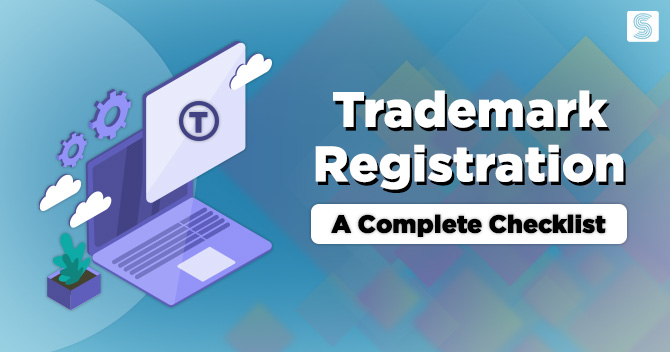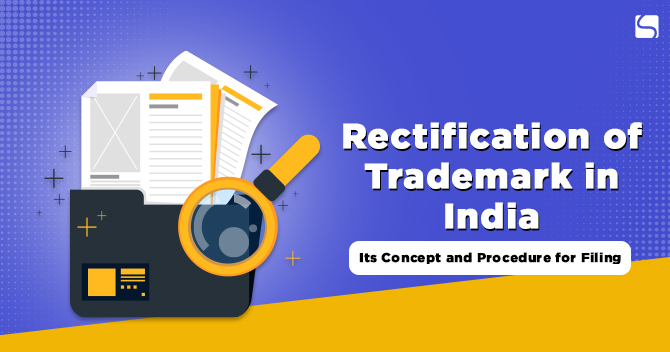Checklist For Registering a Trademark in India

Shivani Jain | Updated: Apr 16, 2020 | Category: Trademark
A Trademark in India is a visual representation or symbol that can be in the form of a word, name, label, colour combination, numbers, etc. used by the business in order to differentiate its products and services from other same goods or services which are made in different business. Know what are the factors included in the Checklist For Registering a Trademark in India.
In India, Trademarks are registered by the Controller General of Patents Designs and Trademarks (CGPDTM)[1], Ministry of Commerce and Industry, Government of India. Further, the Trademarks are registered under the provisions of the Trademark Act, 1999 and provide the trademark owner with the power and autonomy to sue for the losses whenever there is an Infringement of Trademark.
Further, the Registered Trademark act as intellectual property for the business, they are used for safeguarding the company’s investment in the brand or symbol. Also, the Trademarks are essential to get registrable if it is unique in nature for the products and services the owner offers.
If in case one does not get his trademark, logo, punch line, brand name, etc., registered then an imitator cannot be stopped from puzzling the public by using the same or similar deceptive name or mark, which might result in the financial and economic loss to the concerned business in the long-term.
Further, the proposed trademarks which are the same or identical to an already existing registered trademark are not eligible to register. Moreover, trademarks are also not registrable if it is general, unreliable, offensive, not unique, and includes specifically protected emblems, etc.
Once the Trademark Registration Process is done and complete, the R symbol can be applied, and the said registration will become valid for ten years. Further, the registered trademark approaching expiry can regularly renew the said registration process just by filing an application for trademark renewal for the next ten years.
Table of Contents
Who can apply for a Trademark?
Any person can apply for the Trademark Registration. The term any person includes an individual, proprietor, company, or any other legal entity claiming to be the owner of the trademark can apply for registration. Further, the application for the trademark registration can be filed within a few days, and one can start using the “TM” symbol. Moreover, the time required for the trademark registry or to complete its formalities is 18 to 24 months. However, one may use the ® (Registered symbol)[2] next to his trademark once the said trademark is registered and the registration certificate is issued. Lastly, a trademark is registered for a period of 10 years, starting from the date of filing, and the same can be renewed from time to time.
What are the Benefits of Trademark Registration?
Following are the benefits annexed with the concept of Trademark Registration –
- It provides a set of exclusive rights to the registered owner
- Legal protection to the concerned owner against infringement
- Creates a more brand value
- Provides recognition of the quality to the product or services
- It helps in making place in the global market
- It helps in establishing goodwill, brand name and trust for customers
- Trademark is considered as an Intangible Asset
- Global Trademark Registration
- Provides protection for a minimum 10 years that too at a low cost
- Allowed the use of ® Symbol on the company’s logo
- Attract human resources
Also, Read: Top Ten Reasons for Trademark Objection in India
Types of Trademarks available in India
Product Mark
Product Mark assists in identifying the products or goods from the place of services. Here the concerned product is the unique selling facet of the Company. In the beginning, the Product Marks are characterized by the “TM”, which means that the Mark is not yet fully registered, but it is in the course of registration. Once the mark is duly registered, the owner will have to use ® to provide recognition in the market. This is a common practice which is applicable to all types of Trademarks available in India. Examples: Pepsi®, Maggi® etc.
Service Mark
This type of Trademark is used for recognizing and differentiating the services rather than the goods or products provided by any company. Further, Service Markshave their peculiar character which is the “SM”. Also, a very prominent and the most common example of service mark is McDonald’s, which is used for the restaurant services.
Collective Mark
As the name suggests, the Collective Marks are concerned with a group of people and not with one single product or service. This Trademark is primarily owned by a company, institutes or any other association that is associated with several members. Example – “CA” is used by the members who fall under ICAI(Institute of Chartered Accountants of India).
Certification Mark
Certification Mark showcases the standard of a concerned Company, i.e. it shows that the trader’s goods or services are duly certified as they are meeting the required standards. Example – ISI Certification, Wool Mark etc. are one of the finest examples of the Certification Mark.
Shape Mark / Pattern Mark
Patter or Shape mark is used to differentiate between the products.
Sound Mark
It is introduced for the Registration of sound graphics that are used to differentiates the concerned products and services of one from another. Example – Nokia Tune.
Types of Trademark Registration in India
Following listed are the different types of Trademark Registration –
- Generic Mark– A Generic Mark for a trademark, defines the characteristics, ingredients, and qualities of the good or product the concerned business sells.
- Descriptive Mark- A Descriptive Mark identifies one or more features of a product or service concerned. Moreover, this mark is used to describe the product.
- Suggestive Mark– A suggestive mark talks about the goods or services. “A” mark in this group qualifies for the protection without requiring any secondary meaning.
- Fanciful Mark– A Fanciful Mark is a term, name, or logo that is distinct from everything else that exists. This criterion is the easiest way for obtaining trademark protection as it typically does not compete with anything else or become too common.
Function of Trademark
Following are the functions annexed with the concept of Trademark –
- It helps in identifying the source of the service or product
- It guarantees product quality
- Also helps in the Advertisement for the service or product
Why should on opt for the Trademark Registration?
Following listed are the reasons why one should obtain the Trademark Registration –
- Even giant businesses such as coca-cola, Apple, Siemens protect and safeguard their business by means of trademark registration.
- The Trademark acts as a significant asset for the business concerned and also contributes towards the goodwill generation.
- With the help of Registered Trademark, one can stop others from using his or her trademarked business name or logo etc. with respects to the goods or services it is registered
- Trademark can be used just like any other form of a business asset like the real estate, as it can easily be sold, licensed or even assigned
- It guarantees the identity regarding the origin of goods and services.
- Simulates further purchase
- Also serves as a mark of loyalty and affiliation.
- It may enable a consumer to make a lifestyle or fashion statement.
Documents Required for Obtaining Trademark Registration
Following are the documents required for obtaining Trademark Registration –
- Details like Name, Nationality and Address of the concerned applicant
- The Certificate of Incorporation in case of a company or an LLP (Limited Liability Partnership)
- In the case of a company which is eligible and qualified for the lower filing fee, can refer to the Udyog Aadhar Registration
- A detailed description of the goods or services represented by the Trademark
- Trademark application needs a trademark Class (out of a total 45 trademark classes) to be stated, but one is also eligible to file multi-class (Class 99) Trademark application.
- A power of attorney in the Form TM-48 Format (Form of the Authorization of an agent) must be signed by the concerned applicant.
The Validity of a Trademark Registration Certificate
As per Section 25 of the Trade Marks Act, 1999, for a period of ten years a certificate for the trademark registration is valid and, may renew time to time.
Further, the notice for the expiry of the registration will be served by the Registrar to the concerned owner or proprietor of the trademark. Further, the trademark will not be strike-off from the register kept by the Registrar if in case the application is made in the set prescribed form together with the prescribed fee and surcharge within a period of 6 months from the date of last expiration. After that such trademark will be renewed again for a period of further ten years.
How a Trademark is distinct from the Copyright
| Trademark | Copyright |
| The concept of a trademark is applicable to the word, logo, slogans, etc. | The concept of copyright is applicable to the photographs, music, movie, software code |
| Business owners are the applicants for the Trademark | Creative professionals are normally the applicants for obtaining copyright |
| It is valid for 10 years and can be renewed easily | It lasts for 60 years starting from the date of publication or for the lifetime of the concerned person + 60 years |
Procedure for Obtaining Trademark Registration
Following are the steps involved in the process of obtaining Trademark Registration –
- The first and foremost step is to make an application for the Trademark Registration to the Registrar
- Then in the next step, File in the same application to the Trademark Ministry located within the territorial limits of the workplace
- In the next step, after the acceptance of the application but before registration, the registrar after hearing the applicant has the right to withdraw the acceptance.
- Once the said application is duly accepted, the advertisement for the said application is made by the Registrar
- Other parties have the right to raise objections for the said application for a period of three months starting from the date of its advertisement
- Registrar may also permit for the corrections and amendments if in case any
- In the next step, the applicant receives the Certificate of Registration with the seal of the Trademark Registry
- Lastly, the certificate of registration is granted.
Concept of Trademark Objection
If in case a Trademark is registered and the status of the concerned is shown as “Objected”. Then this indicates that the Registrar has received one or more objections on the concerned trademark, this can be possible because of the duplication of the existing registered trademark or else the said trademark is offensive or any other reason out of the several available for the Trademark Objection. Further, the objection is raised under the provisions of section 9 and section 11 of the Trade Mark Act, 1999. Furthermore, in Section 9 the trademark objections are made if the concerned authority established that the trademark is descriptive of goods. In order to overcome such objection, the applicant is required to provide proper evidence and prove distinctive of his or her Trademark.
Further, as per section 11 of the Trademark Act, 1999, the objections are made by the concerned authority when they see that a trademark of similar nature already exists for similar goods, services or products. Whenever any objection is raised, the candidate is required to make sure that he or she gives appropriate documents and reasons within the provided time, as this will help him or her to overcome the objection raised.
Renewal of Trademark
- In India, a trademark can be renewed from time to time for an unlimited period just by making payment of the fees prescribed for the Trademark Renewal, failing which the said mark becomes liable to be strike-off from the Register kept by the Registrar of Trademarks. Further, each renewal term is for a period of ten years.
- In India, the process for filing an application for the renewal of a trademark includes the following listed –
- Request to renew the said trademark in India can be made within six months BEFORE THE EXPIRY of the said trademark registration or the renewal term if escorted by the prescribed renewal fees along with the prescribed form.
- Request for the renewal a trademark in India can also be made within six months AFTER THE EXPIRY of the said trademark registration or the renewal term if escorted by the prescribed late renewal fees along with the prescribed form.
Conclusion
Trademark is a visual representation or symbol that can use by the business to differentiate its products and services from other same goods or services. Further, trademark registration not only enhances the brand value but also provides a set of exclusive rights to the registered owner along with the legal protection against infringement. Lastly, the registration of a trademark will be valid got ten years and, may also renew time to time.
Also, Read: Top Things to Know Before Registering a Trademark in India














